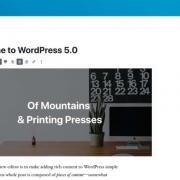Why Use an Open Source eCommerce Platform?
When talking about eCommerce platforms, some are hosted for you – like Shopify, BigCommerce, and Squarespace – with other platforms you choose the host yourself. There’s also another dynamic to consider when considering platforms. It’s the question of licensing.
In this article, we take a look at the open source license and highlight why we think it’s important to pay attention to licensing terms when picking an eCommerce platform.
As BigCommerce points out:
An open source licensing agreement stands in contrast to “proprietary licensing.” When a user first starts a piece of proprietary software (e.g. Microsoft Office, Adobe Photoshop, iTunes) the user typically agrees that they will not alter or modify the source code and will only use the software in the ways prescribed by the manufacturer. The back-end code of proprietary software is kept secret from the public, and anyone attempting to re-engineer or copy the code is subject to legal action by the software’s owner.
(emphasis added by us)
When you choose an eCommerce platform that hides how it works, you’re basically making these agreements with the platform vendor:
- I only need the features you give me, when you give them to me.
- I don’t have any desire to understand how a feature is implemented.
- I don’t have any custom needs that may require me to adjust the software.
- I’m going to trust that you’re keeping the software updated, in line with best practices.

If all of these are fine with you, you can skip the rest of this article and sign up for a proprietary platform.
But wait. There’s one more dynamic that often comes with proprietary licenses: they have a yearly license cost.
That’s right, some platforms can cost tens, if not hundreds, of thousands of dollars a year in licensing – and that might not include the hosting.

So let’s look at why you might want to strongly consider (beyond the fact that open source software doesn’t come with yearly license fees) an eCommerce platform using open source.
The Open Source Community
Because open source software developers aren’t always paid (or sponsored) to work on open source projects, it’s often a labor of love. That means developers are passionate about their projects.
Many developers around the world actively working on the platform means that when store owners face problems, they’re either already solved, or the community can craft a new solution.
Because you or your developer can access the code itself, finding an answer is often quick and easy. You’ll often find something written by a community member, detailing how they solved a problem.
Or you may find additional code that does exactly what you need. These features frequently come as additions to an open source platform, commonly referred to as plugins. Hundreds of plugins are available for the largest platforms like WooCommerce. Many are even free.
In fact, many times these free plugins exist because a company paid a developer to build and deploy the functionality for their own store, and then shared it back with everyone else. That’s the nature of the open source community.
In the end, a rising tide lifts all ships.

You own the code, so you can change it
When using an eCommerce platform that hides the code from you, in environments where you can’t even change things, you’re risking your store’s success.
When your store resides on someone else’s platform, it’s like you’re renting rather than being an owner. This digital sharecropping can be an especially disastrous proposition because sharecroppers are subject to the whims of the landowner.

The alternative is to be more in control of your own success. This is more easily done with open source platforms which put you in control of all aspects of your store. This means you get anything you want, but it often comes with a price.
You’ll often find that you need to spend money, even in the world of open source, for code that integrates your store with other platforms, and to create custom solutions when you need something more complex than what the platform offers.
Third-Party Integrations
Your store is going to do a lot for you, but it won’t do everything. It may take a person’s order, but it’s not likely going to send them a postcard. You’d use another service for that.
It may tell you that you need to ship a product, but you likely need to get the tracking from another service.
Your store may sell products in other states, but you’re going to have to calculate the taxes that are applicable to every different jurisdiction.

All of these are simple examples of where you want someone else’s expertise, in the form of their code, on your site. And the best part is that you don’t have to become an expert in tax calculation, shipping price algorithms, or store a bunch of blank postcards in inventory.
But these features don’t come free. You’ll have the cost of each of these commercial plugins, while also potentially needing a developer to evaluate many of them to pick the right one for you.
While this sounds like a negative dynamic and feels like it suggests you should consider a hosted and proprietary platform, just know that the upside here is that you can choose from multiple shipping or taxing solutions to pick the one that works the best for you.
That’s not a big deal with taxing, but it can be huge when it comes to other areas like promotional campaigns and discount codes. Tons of different stores like to do discounts differently. And that’s when you really see the power of an open source platform shine.
It means you have choices.

Customizations for Complex Scenarios
It doesn’t matter how complicated a store feature is, if you can dream it, open source can handle it.
In the best of all possible cases, you will find a plugin that already solves your problem.
In the case that you can’t find a plugin, there are developers around the globe, all actively working with most of the open source eCommerce platforms. That means someone may be working on your problem at this instant.
Otherwise, you may need to hire a professional developer to help.
Either way – if you pick a plugin to extend your store, so it can work the way you want it to, or if you hire someone to do that for you – you’re going to get the store you want. And that feels vastly different to being forced to run your store according to someone else’s agenda.

Three reasons to choose open source
So as we wrap up, let’s bring this to a close by summarizing everything we’ve been talking about. Here are the three reasons why we strongly urge you to consider an open source eCommerce platform.
- When you run your store on open source eCommerce platforms, you’re not going to get a yearly licensing bill.
- When you run your store on open source eCommerce platforms, you’re not going to have trouble finding a community of resources to help you customize it.
- When you run your store on open source eCommerce platforms, you’re not going to be dictated by the platform telling you how features should work.
Now that you’ve learned the benefits of using an open source eCommerce platform, check out our Managed WordPress / WooCommerce Hosting platform.








